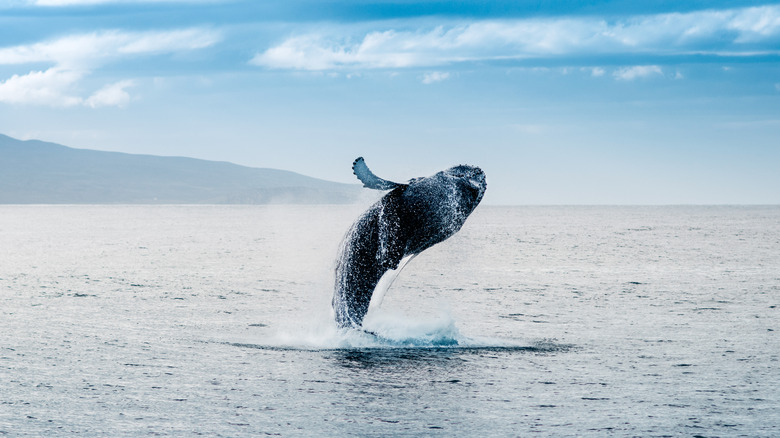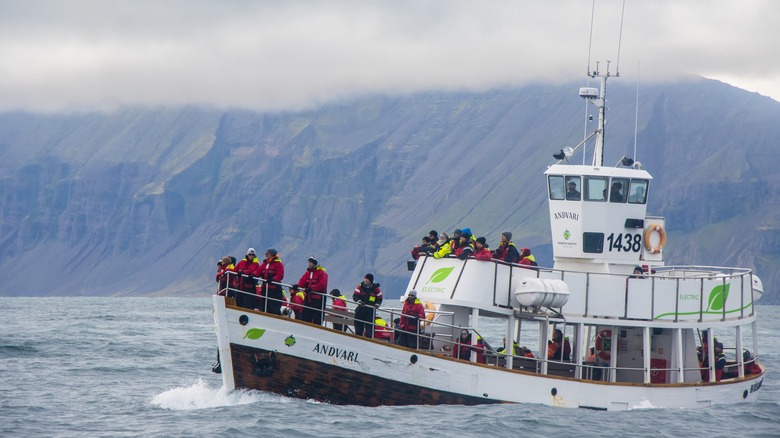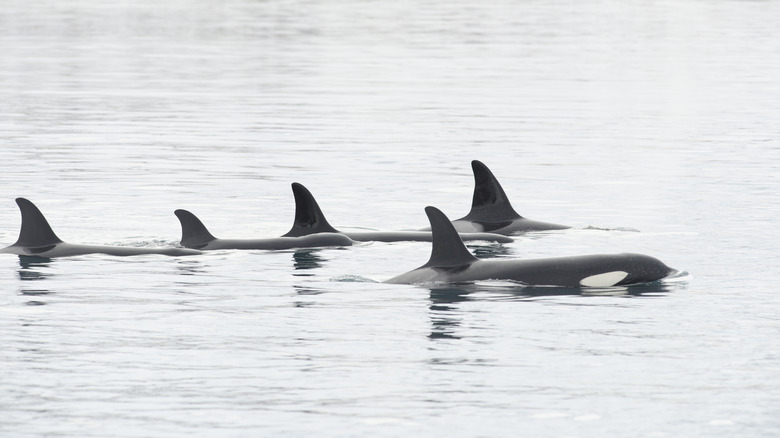The Best Times Of Year To Go Whale Watching In Iceland
There are places on Earth that successfully capture the imagination thanks to an array of stunning natural features. Iceland is one such place: it offers spectacular scenery and experiences in nature. Pairing a rich culture with wonderfully wild landscapes, the "Land of Fire and Ice" is tantalizing to travelers from across the globe.
The ethereal beauty of Iceland is enjoyed by just over 376,000 year-round residents, according to Statistics Iceland. That number jumps significantly with the country's nearly 500,000 visitors a year, according to World Data. A trip to Iceland is a chance for visitors to experience ancient glaciers, picturesque waterfalls, hot springs, lagoons, volcanoes, and black sand beaches.
Destinations travelers come to explore often include the Blue Lagoon, the Strokkur Geysir, Landmannalaugar National Park, and the Skaftafell Ice Cave. Viewing the northern lights in person is endlessly appealing as well. Whale watching is also a top year-round activity available to experience in Iceland for travelers who are looking to encounter some of the sea's most majestic creatures.
Sea Iceland indicates that at least a dozen different species of whales consistently call the waters around Iceland home. This variety is the result of the Nordic island's location in a place where warm and cold ocean currents collide seamlessly. While there are opportunities for visitors to enjoy whale-watching tours here at any time, summer and winter are often the best time of year to go whale watching in Iceland for specific and varying reasons.
The many benefits of summer whale watching
Travelers who enjoy outings into nature when the weather is warmer will find summer to be the best time to make the most of whale-watching adventures in Iceland. According to Weather Spark's tourism score for the city of Reykjavík, the ideal time of year for summer travel to avoid adverse conditions is July and August. Better average weather means fewer chances of having a whale-watching tour you've booked canceled during your stay.
Summer is also the season that typically attracts the greatest number of whales to the surface of the water for tour viewing. Sea Iceland reports that some of the most regularly spotted whales in the area include minke whales and humpback whales due to their tendency to linger along the coast. That said, there's always a chance you'll catch a glimpse of whales that are more oceanic such as blue whales, bottlenose whales, and orcas too.
If you're looking to pair whale watching with opportunities to see other local wildlife as well, summer is the season for you to take a tour. According to Guide to Iceland, basking sharks are commonly spotted in the water during the summer season. Adding bird watching to the experience is simple as well, thanks to the many puffins and arctic terns that are feeding this time of year.
Enjoy dynamic whale watching in the winter
Those who don't mind bundling up for whale watching will find winter is a thrilling season to book a tour in Iceland. According to Visit Iceland, whale-watching tours depart less frequently in the winter than in the summer, but the sparkling seasonal views make up for any potential for weather cancellations. Guide to Iceland lists the months of November, February, and March as the most off-peak travel months in the country. This would mean winter whale-watching tours are more likely to be less crowded.
Winter also comes with the advantage of showcasing whale species that are less visible in the summer months. If you happen to be heading to the northern part of Iceland to enjoy a tour, Arctic Adventures points out that there's a good chance you'll have the opportunity to get your eyes on belugas. Those travelers sticking closer to southern Iceland departure points increase their odds of spotting orcas who spend this time of year hunting throughout the frigid waters.
A winter whale-watching experience gives travelers time to pair their experience with other seasonal activities in Iceland too. Reykjavík Excursions highlights winter snowmobile tours across snowy landscapes as a great option. Gorgeous glacier hikes are another prime example of added winter fun. No matter when visitors make their way to Iceland, whale watching is worth enjoying. Both summer and winter tours are optimal for dynamic viewing experiences. Either way, it's bound to be unforgettable.


